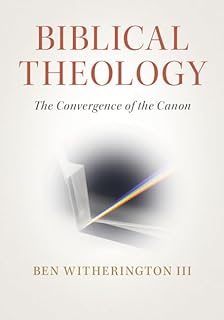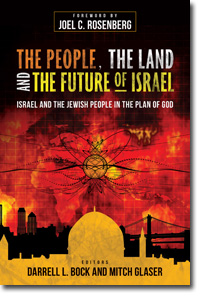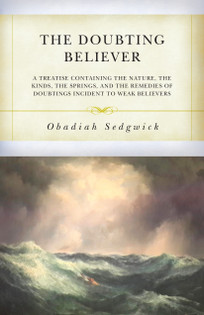Series so far: Christ at the Center: The Fulcrum of Biblical Covenantalism –
Introduction: Parts 1a, 1b, 1c, Jesus and the New Covenant: Part 2a
When one examines the Old Testament’s unilateral covenants a picture emerges which shows how each covenant: the Noahic, the Abrahamic, the Priestly, and the Davidic, are bound together in their future fulfillment with the New Covenant in Jesus Christ. This feature of the covenants is plainly present in two important prophetic passages, Jeremiah 33 and Ezekiel 37.
Four covenants are either directly quoted or else clearly alluded to in Jeremiah 33:
14 `Behold, the days are coming,’ says the LORD,`that I will perform that good thing which I have promised to the house of Israel and to the house of Judah: 15 `In those days and at that time I will cause to grow up to David A Branch of righteousness; He shall execute judgment and righteousness in the earth [Isa. 11:1-10 – This is Christ at His second advent]. 16 In those days Judah will be saved, And Jerusalem will dwell safely. And this is the name by which she will be called: THE LORD OUR RIGHTEOUSNESS.’ 17 “For thus says the LORD:`David shall never lack a man to sit on the throne of the house of Israel [Clear reference to the Davidic covenant in 2 Sam. 7; Psa. 89:34-37]; 18 `nor shall the priests, the Levites, lack a man to offer burnt offerings before Me, to kindle grain offerings, and to sacrifice continually.[Clear reference to the covenant with Phinehas in Num. 25:12-13. Cf. Psa. 106:30-31] ‘” 19 And the word of the LORD came to Jeremiah, saying, 20 “Thus says the LORD:`If you can break My covenant with the day and My covenant with the night, so that there will not be day and night in their season [a reference to the Noahic covenant preamble in Gen. 8:21-22], 21 `then My covenant may also be broken with David My servant, so that he shall not have a son to reign on his throne, and with the Levites, the priests, My ministers. 22 `As the host of heaven cannot be numbered, nor the sand of the sea measured [strong allusion to the Abrahamic covenant in Gen. 15], so will I multiply the descendants of David My servant and the Levites who minister to Me.'” 23 Moreover the word of the LORD came to Jeremiah, saying, 24 “Have you not considered what these people have spoken, saying,`The two families which the LORD has chosen, He has also cast them off ‘? Thus they have despised My people, as if they should no more be a nation before them. 25 “Thus says the LORD:`If My covenant is not with day and night, and if I have not appointed the ordinances of heaven and earth [probable reference to the creation ordinances, not covenant], 26 `then I will cast away the descendants of Jacob and David My servant, so that I will not take any of his descendants to be rulers over the descendants of Abraham, Isaac, and Jacob [reference to the Abrahamic covenant]. For I will cause their captives to return, and will have mercy on them.'”
Please notice carefully when and how these four covenants will be fulfilled: at the time when
“the Branch” (Christ) will “execute judgment and righteousness in the earth.” (v.15). At that time, “Judah will be saved, And Jerusalem will dwell safely. And this is the name by which she will be called: THE LORD OUR RIGHTEOUSNESS.'” (v.16). This salvation is issued through the New Covenant in Christ. If this is sound we have here evidence that four major biblical covenants (Noahic, Abrahamic, Davidic, and Priestly) will find their fulfillment by means of the New Covenant at the Second Advent.
I ask that my readers would postpone any thoughts about the New Covenant already having been made with the Church. I accept that that is so, and we shall look into it, yet these texts must be allowed to speak. And I believe the “problem” that arises can be adequately treated once the passages are pondered and their statements set out clearly. But let us show this phenomenon of major covenants being contingent on the New Covenant in another passage:
There are three covenants discernible in Ezekiel 37, as well as the New Covenant:
11 Then He said to me, “Son of man, these bones are the whole house of Israel. They indeed say,`Our bones are dry, our hope is lost, and we ourselves are cut off!’ 12 “Therefore prophesy and say to them,`Thus says the Lord GOD: “Behold, O My people, I will open your graves and cause you to come up from your graves, and bring you into the land of Israel. 13 “Then you shall know that I am the LORD, when I have opened your graves, O My people, and brought you up from your graves. 14 “I will put My Spirit in you, and you shall live [This is surely a reference to the New Covenant. Comp. Ezek. 36], and I will place you in your own land [Part of the Abrahamic covenant, sometimes called the “Land Covenant”]. Then you shall know that I, the LORD, have spoken it and performed it,” says the LORD.'” 15 Again the word of the LORD came to me, saying,…21`Thus says the Lord GOD: “Surely I will take the children of Israel from among the nations, wherever they have gone, and will gather them from every side and bring them into their own land; 22 “and I will make them one nation in the land, on the mountains of Israel; and one king shall be king over them [Davidic covenant – there has never been a king in Israel (n.b. the recurring motif of “the mountains of Israel in Ezek. 34-39) since this prophecy] all; they shall no longer be two nations, nor shall they ever be divided into two kingdoms again. 23 “They shall not defile themselves anymore with their idols, nor with their detestable things, nor with any of their transgressions; but I will deliver them from all their dwelling places in which they have sinned, and will cleanse them [New covenant]. Then they shall be My people, and I will be their God [standard covenantal relationship promises appended to the biblical covenants]. 24 “David My servant shall be king over them [Davidic covenant – the details of how both Jesus and David can be king in Israel are not given, but such a thing was not uncommon in Bible history], and they shall all have one shepherd [cf. Ezek. 34:11-15, 23-24]; they shall also walk in My judgments and observe My statutes, and do them [New Covenant]. 25 “Then they shall dwell in the land that I have given to Jacob My servant, where your fathers dwelt; and they shall dwell there, they, their children, and their children’s children, forever [Abrahamic covenant]; and My servant David shall be their prince forever [Davidic covenant]. 26 “Moreover I will make a covenant of peace with them, and it shall be an everlasting covenant with them; I will establish them and multiply them, and I will set My sanctuary in their midst forevermore. [a sanctuary (and tabernacle – next verse and chs. 40ff.) requires a priesthood. Ergo, the Priestly covenant] 27 “My tabernacle also shall be with them; indeed I will be their God, and they shall be My people. 28 “The nations also will know that I, the LORD, sanctify Israel [New covenant], when My sanctuary is in their midst forevermore.”‘” – Ezek. 37:11-28.
Here, three covenants are connected with the cleansing brought about through the New Covenant. And you cannot have the New Covenant without the One who initiates it and mediates it. Therefore, Christ is essential to the realization of all these covenants.
The Covenant Maker is Himself the Covenant.
In the same way Jesus is both the propitiation and the propitiator. When one thinks about the work of propitiation this fact comes clearly to the surface. The NT view of propitiation is not the appeasement of a moody and contrary god, who has to be feted and won over to gain his blessing. It is the appeasement of the unchangeably holy and true God whose righteous justice must be satisfied by an appropriate Divine action. Sinners need propitiation because it turns away from them the righteous judgments of God. God’s wrath has to be propitiated (turned from off of those who deserve it) if sinners are to be saved. By becoming a man like us, Jesus’ death on the Cross as the One “who takes away the sin of the world” (Jn. 1:29), both propitiated God and made Him our propitiation (1 Jn. :2; 4:10). Jesus both made propitiation by His blood (Rom. 3:25), and He is our propitiation.
Along very similar lines, we think, He is both Mediator of the New covenant (Heb. 12:24 – something to which we must return), and, in fact, the covenant itself! Because the New Covenant is “in His blood,” and is bound, not just to Christ’s death but to Christ’s resurrection life (Lk. 22:28-30. Cf. Jn. 10:17-18), which is life in the Spirit (2 Cor. 3:6), the covenant making cannot be separated from the covenant Maker. Jesus is the New Covenant. And there can only be one. All fulfillments of the other biblical covenants flow through Him. Nothing circumvents Him who made all things, upholds all things, redeems all things, and who will reign over all things. All things are, after all – His (Col. 1:16).
More on Christ as the New Covenant next time…





10 comments On Christ at the Center (Pt.2b)
Excellent stuff, Paul. Thanks.
Glad to see the New & Different jubject! The Old Testament Covenants + The New Testament or New Covenant
is extremely important! The New Covenant is for Israel. The Church is the Body of Christ, the Bride of Christ, &
has NOTHING to do with the New Covenant that was offered at Pentecos, rejected by those to whom it was
offered. The Church,began at Pentecost & after the remnant had been reached, grew into the Mystery of which Paul speaks.
I look with enjoyment for your new posts.
God bless,
John Gregory
Hi John Gregory and Paul Henebury,
its hard to understand why you exclude Christians from the New Covenant.
it appears the crucial word is “all” when the promise states “all” will know the Lord. therefore your mind thinks of the time of the Kingdom, when initially all will be redeemed. i hold that the “all” could be the called who now have the anointing and do not ultimately need any to teach them (I John).
as for Israel with whom the covenant was made, this was at Shavuot (First Fruits [of Israel]) when faithful Jews would “appear before the Lord”. the many languages demonstrate not only the Hellenistic Jews “living” in Jerusalem but probably other Jews from those countries who make up all 12 tribes. so the New Covenant was made with the House of Israel and Judah. 3000 Jewish Christians and later more were the “First Fruits”. it was only later revealed to the apostles that Gentiles would be included in this covenant.
Luke 22:20, I Cor. 11:25, Heb.ch. 8,9,10,12 clearly are explicit in grounding the New Covenant for Christians in this age.
John,
You are far more dogmatic about the Church’s relation to the NC than I would be. In fact, I would not agree with your assessment I’m afraid. A keystone of my approach in this series is that nothing comes to its full realization without Christ and the NC.
I would like to know why you have arrived at such a determination though 🙂
God bless,
Paul
Brother Paul & Others: I am glad to hear from you personaly. You state that I am some what dogmatic in my Theology.
So I am. Also Brother squeaky2 tells me that it is hard to understand why I exclude The Church from the New Covenant.
To me, the Church has a heavenly destiny while the Jewish Nation in Prophecy has an earthly kingdom. The Church Is a Mystery
not revealed in prophecy. The Kingdom is Jewish. The Body of Christ & the Bride of the Lamb are the same thing.
I do not wish to debate the issue. I simply want to state what I dogmaticly believe the Scriptures say. There is a definate
relation to Covenant Theology & Calvinism.. Two schools of thought that I am very much against.
I am going to submit a list of authors that I have read for the last 40 years, and these Theologians have stated what I choose
to follow and believe. Richard Baxter, William Newell, C. Ryrie, L. Chafer, M.J. Stanford, C.R. Stam, C.I. Scofield, C.G. Olsn, B.
Ramm, J.D. Pentecost, Arno Gaebelin, C. Larkin J.N. Darby, and many others.
Yes, You may find small amounts of error in their writtings, as you will in any human author, but these & others like them state
my Basic Theology. ANY relationship of the Church with the covenants of God with Israel utterly fails to recognize the Pauline
Dispensational Truth. The glorified Lord directly communicated ONLY to Paul the great fundamentals of the heavenly Church
Gospel, and the NEW revelation concerning His Body–truths that He never shared with the nation Israel. These truths concerned
OUR identification with & in Christ crucified, buried, resurrected, and ascended, OUR HEAVENLY POSITION; our co-heirship & co-reign
with our Beloved Bridegroom!
INFINITELY ABOVE — All the while the Lord Jesus’ Heavenly Gospel (given to Paul in content & POSITION is infinitely ABOVE the
Kingdom Gospel that he shared with earthly Israel — which they rejected. Those who are ignorant of, and hence not centered in, the PAULINE
GOSPEL as set forth in the Letters of Paul, are constantly astray in their interpretation of the Gospel, to say nothing ofall-important hurch truth.
NOW, Brother Paul, I understand I think, why you call yourself the Reluctant Dispensationalist. Do to your stance on covenant theology,
it is wize NOT to be a dgmatic dispensationalist. I am a HARDCORE DOGMATIC PAULINE DISPENSATIONAL BIBLICIST. This is the stance
that I have proven to myself through 44 years of Theololical & Biblical studies. I have read the New Testament in most English translations & in three
of the Greek translations. What I have submitted above is NOT for the purpose of debate. I wish only to tell you and my other Godly Brothers werein
I stand.
May God richly bless all,
Your humble servant,
John H. Gregory
Appreciate you John,
The list of authors you give is impressive. Many of them have places of honor in my library. I call myself a reluctant dispensationalist for two main reasons: first, because I am embarrassed by the Hal Lindsey, Tim LaHaye branding of dispensationalism which gives it a bad name. Second, because I think it is ill-defined and hence self-defeating in its narrowness. Still, much of my understanding of Scripture might be termed “dispensational,” especially my eschatology.
I want you to feel comfortable with commenting here as long as we can disagree with each other amicably. I am far from claiming that I’ve got it all figured out and I value comments which either encourage or critique my ideas. You are right to point out the difference in material promises to Israel and “spiritual” promises to the Church, although I would not cleave to the earthly/heavenly dichotomy as some older dispensationalists did.
Thank you again.
Your brother,
Paul
Hi John,
to say that Gentile Christians have entered into the blessings of the covenants and commonwealth of Israel does not make the proponents hold to Covenant Theology. I am a Dispensationalist last time i checked but admit to not necessarily superimposing a dispensational theological grid onto the text of God’s truth whenever i read it.
the bigger issue certainly has to do with holding a consistent hermeneutic and not a replacement theology of Israel with the Church. Gentile Christians do have access by the same Spirit to the nourishing root of the olive tree. they are also circumcised in heart and are true Jews in God’s sight since they too are children of promise as Issac.
holding these truths does not mean that God’s plan for the physical descendants of Abraham is abrogated. I believe the Church is raptured before Jacob’s trouble and look forward to when Jesus will set up His Kingdom afterward.
as a qualifier I should have said “unbelieving” physical descendants of Abraham since those who believe are part of the body of Christ and will miss Jacob’s trouble in the Rapture.
THank you all for your replys & God bless!
John Gregory
The concept of the union of the New covenant with Christ ( He is mediator and actually is the New Covenant) is a new and fresh idea… this I will have to ponder– tho I am attracted to it…..It is easier for me to see Him as propitiator & and the propitiation but drawing the same conclusion on the topic of the New Covenant is a little harder for me to grasp….. I will carry on with the study……..I was well aware of most of the rest of the post — thx Paul…..